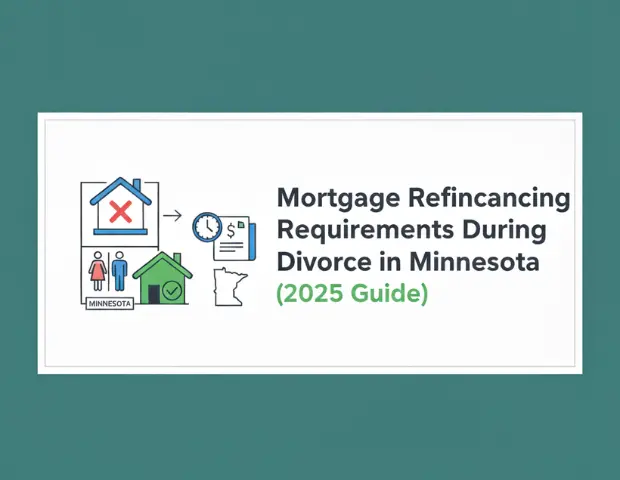
Key Takeaways
- Refinancing during divorce in Minnesota works best before the divorce is finalized; it’s simpler and often easier to qualify.
- Alimony and child support payments count as income with proper documentation but require a six-month history to be included in mortgage qualification.
- A cash-out refinance is required for a buyout; “limited cash-out” rules may apply, depending on loan type.
- Lenders require a clear, court-approved settlement agreement detailing equity splits, payment obligations, and timelines.
- Missed payments can ruin eligibility for refinancing—consistency is crucial.
- For help, visit mortgageforest.com/mortgage-refinancing/, call (612) 590-7896, or email [email protected].
Refinancing is the most common path for one spouse to “keep the house” and buy out the other after divorce. Yet, executing a divorce buyout refinance comes with special requirements—and real challenges if you wait too long, have credit issues, or need support payments to count as income.
Let’s break down refinancing requirements in detail so you can plan your next steps with confidence.
Timing: When Should You Refinance?
There are three main options for timing:
1. Before Filing for Divorce
- Simplest path: You’re still “married” in lender eyes, making it easy to remove one spouse from the loan during refinancing.
- You’ll need only a quitclaim deed to adjust the home’s title.
- No court documents are required—just regular lender paperwork.
2. During Separation/Divorce Proceedings
- Lender will ask about your marital status and need a written agreement (or preliminary settlement) showing how equity will be divided and who pays what.
- This process can add months—lenders need to see legal clarity before refinancing.
- Both spouses must sign off; conflicts can delay or halt progress.
3. After Divorce Is Final
- The most paperwork-intensive route. You’ll bring your signed divorce decree and Marital Settlement Agreement to the lender.
- Assets and payments defined in your decree will be used to calculate debt-to-income, including alimony and child support.
- If you intend to use support or maintenance as income, you need a six-month history of payments and documentation that they’ll continue for three years.
- New monthly obligations make qualifying harder; build these into your planning.
Documentation Requirements
Lenders require deeply detailed paperwork for divorce refinances:
- Divorce decree or Marital Settlement Agreement, showing who gets the home, who pays whom, and equity split details.
- Quitclaim deed, to transfer home title into the name of the retaining spouse.
- Mortgage statements and payoff quote.
- Proof of income (W-2s, pay stubs, support payment records).
- Two-year employment history for the retaining spouse. Non-traditional lenders may allow a shorter work history with at least 20% home equity.
- Credit reports and debt-to-income ratio calculations, updated with new support or maintenance orders.
Qualification Challenges
1. Work History and Income
A major hurdle is that sometimes, a homemaker spouse has little recent work history. Standard lenders require two years, but some “non-QM lenders” let you refinance with at least 20% equity in the home.
2. Debt-to-Income Ratio
Alimony and child support payments push DTI higher, making loan approval more difficult. Be ready to show support orders and their impact on monthly budget.
3. Credit Standing
Divorces often ruin credit—missed payments, maxed cards, joint accounts left open. Lenders scrutinize recent credit activity; missed mortgage payments can doom refinancing.
Refinance Types
Rate and Term Refinance
- All you do is refinance the existing mortgage balance plus closing costs. This is possible if the buyout doesn’t require additional equity.
Cash-Out Refinance
- You refinance more than your current mortgage, taking out extra cash for a buyout of your ex-spouse’s equity.
- The property must typically have been jointly owned (and nobody can pocket more than their allotted share).
Buyout by Other Assets
If the retaining spouse cannot qualify to refinance, they may offer cash, stocks, or other marital property as a swap for the ex’s equity. Regardless, court documentation and quitclaim deeds still apply.
Legal Deadlines and Agreement Terms
- Divorce courts set enforceable deadlines for refinancing or selling the property. Failure to meet them may require a sale of the home.
- All agreement terms—including payment periods, buyout figures, and right of first refusal for sale—should be outlined in the settlement.
Practical Steps
- Gather all documents early: agreements, pay statements, mortgage info, work history.
- Shop lenders: especially if rates are high—look for non-conventional options.
- Keep current on mortgage payments: missed payments kill your refinance eligibility.
- Coordinate quitclaim deed with refinance closing: avoid premature transfer before loan is approved.
- Consult divorce mortgage specialists and attorneys: professionals can solve unique timing or qualification issues.
FAQ
Do I have to refinance?
Usually, only if the divorce court requires it (often when one party keeps the home).
Can I refinance before my divorce is final?
Yes; it’s often easier. You may complete the transaction as spouses, then finalize title with a quitclaim deed.
How long do I have to refinance after divorce?
Your court order or settlement will set the timeline—be prompt to avoid complications.
What if I miss mortgage payments during divorce?
It can prevent future loan approval—work together to keep the mortgage current.
Conclusion
Refinancing during divorce in Minnesota requires planning, cooperation, and meticulous documentation. The earlier you start—and the more professional guidance you seek—the smoother your transition will be.
Don’t wait until after your decree is signed—visit a divorce mortgage specialist, call (612) 590-7896, or email [email protected] for expert help today.
